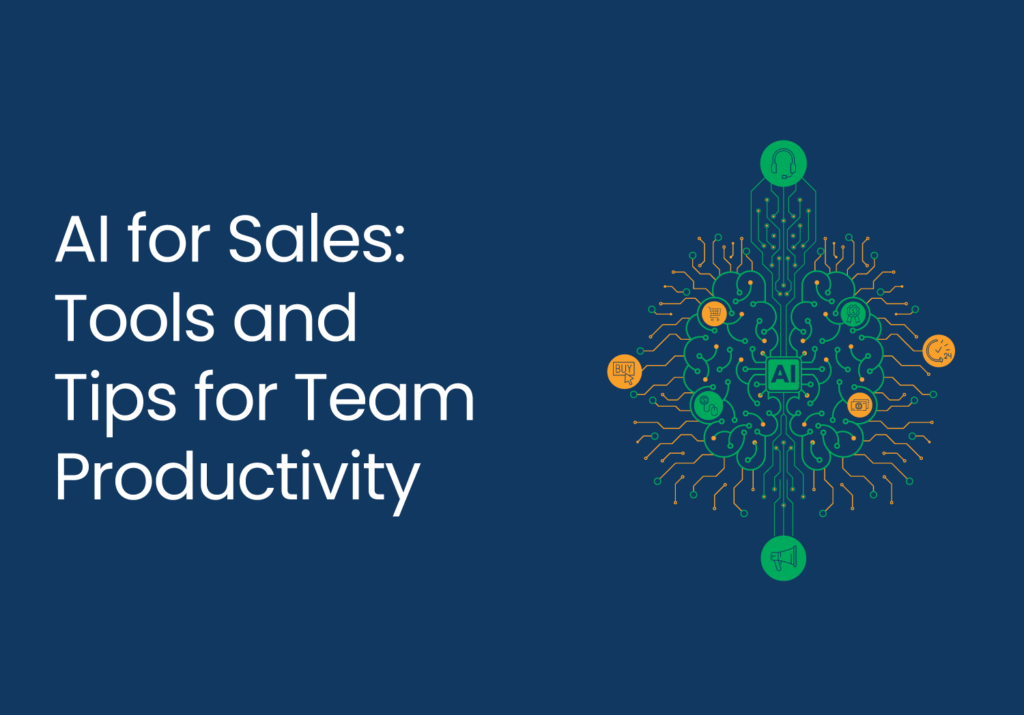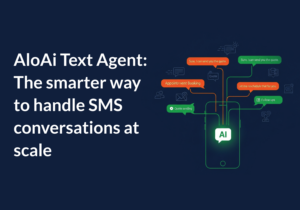Table of Contents
A McKinsey research shows businesses that pioneered AI in sales are seeing the benefits.
One huge problem with sales calls is time wasted calling low-quality leads. The second problem is the inability to capture leads and book appointments automatically.
However, using AI in sales results in an increase in leads and appointments of more than 50%, a reduction in call time of up to 70%, and an overall cost reduction of up to 60%, according to the research.
These numbers signal exponential growth for small and medium-sized businesses (SMBs) using an integration of an AI for sales solution and a cloud phone system to make sales calls.
In the article, we discuss the leading sales AI tools and provide tips that sales teams can use to hit their sales quotas half the time. Let’s begin.
AI for Sales
What is AI in sales? – AI for sales is using artificial intelligence to simplify, optimize and scale sales processes.
While the creative process of sales, like persuasion and complex decision-making, is left to humans, using AI in sales offers insights into customer behavior and buying habits.
The role of sales AI is to use machine learning algorithms to solve complex sales-related cognitive problems. The results are actionable insights that sales professionals can act on.
Components of AI for Sales
Artificial intelligence is built on several tools that produce desired results. For AI in sales, these solutions are designed to enable sales processes.
These types of AI sales components include;
- Natural Language Processing (NLP)
NLP refers to the method of communicating using intelligent systems. It is applied in language translation, speech recognition, and extraction of insightful information.
On the other hand, Natural Language Understanding (NLU) enables computers to understand human language in structured and unstructured data to derive critical insights.
Artificial intelligence in sales using NLP is set to help organizations solve challenges and extract opportunities in the following ways:
- Improve customer experience beyond chatbots to more intelligent natural language questions/responses.
- Track sales agents’ performance to boost productivity and agent training for sales conversions.
- Enhance sales professionals’ training with AI sales coaching tools.
- Machine Learning (ML)
Machine learning is the rail behind language translations, conversational AI, and predictive text.
In technical terms, machine learning is a branch of artificial intelligence focusing on algorithms and data that mimic human cognitive intelligence.
AI in sales applies machine learning to solve complex sales processes. For instance, machine learning can analyze customer data in customer segmentation to identify patterns and segment customers. This can be categorized based on preferences, behavior, and purchasing history.
As a result, this helps sales teams to tailor their messages and offers to each customer segment, improving the effectiveness of their sales efforts.
- Smart Process Automation (SPA)
Smart Process Automation (SPA) is the integration of advanced technologies, such as Artificial Intelligence (AI) and Machine Learning (ML), to automate repetitive and routine tasks that humans traditionally perform.
The technology aims to improve efficiency, reduce errors, and optimize business processes. This technology has many applications in sales, enabling organizations to optimize their sales processes, increase productivity, and improve customer engagement.
For example, SPA can use historical sales data to generate accurate sales forecasts in sales forecasting. This can help organizations make informed inventory, staffing, and other resource decisions.
Ways AI for Sales teams can boost productivity
AI in sales reduces guesswork in sales lead qualification. Additionally, sales teams can boost productivity using AI in their sales processes.
- Sales Data Analysis
Sales AI can analyze real-time data and provide insights into customer behavior, product performance, and market trends. This helps sales teams make data-driven decisions and identify new opportunities.
- Sales Forecasting
AI-powered analytics can provide accurate sales forecasts based on historical data, market trends, and other factors. This information helps sales teams make informed decisions and allocate their resources effectively.
- Personalization
AI can help sales reps tailor their outreach to individual prospects by analyzing their previous interactions and behavior patterns. This can lead to more personalized and effective communication and higher conversion rates.
- Lead Scoring and Prioritization
AI algorithms can analyze vast amounts of data and help sales teams prioritize leads most likely to convert, allowing reps to focus their time and effort on the most promising prospects.
Tools for AI in Sales
Artificial intelligence for sales uses proven tools to help sales professionals hit their revenue targets. One such solution is conversational AI -which is designed to mimic human conversations and provide users with personalized and responsive experiences.
Sales professionals can use the rails that build conversational AI solutions (Natural Language Processing and Machine learning) to perform different tasks that boost teams’ productivity.
Some of these conversational AI solutions for sales include:
Chatbots
Aloware’s AI chatbot is designed to help sales professionals boost their productivity in a couple of different ways:
- Engage with potential customers in real-time.
By answering frequently asked questions, providing product recommendations, and offering support, AloAi SMS Bot can help build customer trust and rapport, leading to more sales.
- Automating repetitive tasks.
This includes scheduling appointments and sending follow-up emails. The goal is to help sales professionals to be more efficient with their time.
This allows them to focus on higher-value activities, such as building customer relationships and closing deals.
- Automate lead qualification
The conversational AI tool is programmed to ask qualifying questions to website visitors to determine if they are potential leads. This allows sales professionals to focus their time and energy on leads more likely to convert instead of wasting time on leads that could be a better fit.
Voice Assistants
Voice AI assistants for sales can help sales development representatives (SDRs) to manage their schedules and tasks more efficiently.
For instance, a sales rep could ask the AI assistant to schedule a meeting with a prospect, set a reminder to follow up with a lead, or update their CRM system with new information.
This frees up the sales rep’s time to focus on more high-value tasks, such as building client relationships and closing deals.
Examples of voice assistants include:
- Alexa by Amazon
- Google Assistants
- Siri by Apple
Sales AI tips for teams’ productivity
- Send personalized sales outreach emails.
- Prioritize leads based on their likelihood to convert.
- Automate repetitive sales tasks like scheduling and data entry.
- Analyze sales data to identify patterns and trends that can inform sales strategies.
- Use chatbots like AloAi SMS Bot to respond to customer inquiries quickly and efficiently.



